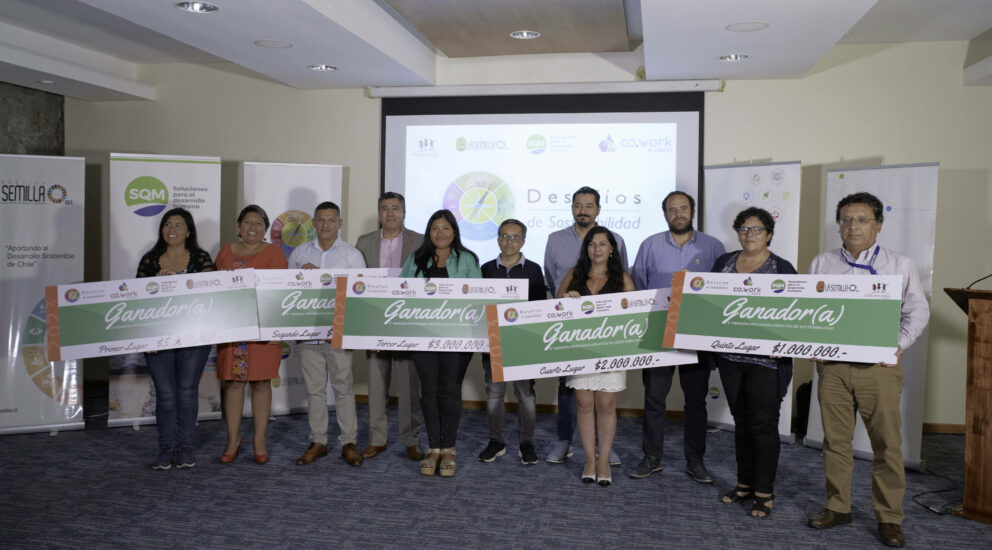News
Sustainability Challenges Program Recognizes Entrepreneurs in Tarapacá

After five months of creating, developing and strengthening projects focused on environmental protection, the circular economy, sustainable agriculture and gender identity and inclusion, the Sustainability Challenges Program gave awards to the top five initiatives in Tarapacá to enable them to develop and launch their ventures.
Alto Hospicio participant Juana Palape, who submitted the project, “Compostable Seed Paper Journal,” won first prize in the second Sustainability Challenges Program, organized jointly by El Puerto Cowork, SQM, Fundación La Semilla and Fundación Factor de Cambio.
After reviewing the 61 projects submitted, 16 finalists were chosen from Iquique, Alto Hospicio, La Huayca, Pozo Almonte, La Tirana, Matilla, Pintados, and Pica to pitch their projects at a special event.
After this pitch round, the five best proposals in the region were chosen by the jury, which was comprised of Corfo Regional Director, Catalina Cortés; Sercotec Regonal Director, Guillermo Vicentelo; the representative from the Regional Government’s Industry and Development Division, Joshua Langenegger; SQM’s Head of Production Development, Alejandro Fernández; and Franklin Zepeda, founder of Ecofiber, the company that won the first Sustainability Challenges Program.
Fifth place went to the “Plastic Wood Creation” project, proposed by Marisol Acuña (La Huayca), who received a prize of one million Chilean pesos. The “Ecofriendly Dispensers” proposal submitted by Rocío Bertin (Iquique) took fourth place, with a prize of two million pesos. In third place was “Vermiculture in the Pica Oasis,” from Lucero Callpa (Matilla), who was awarded three million pesos. Second place went to “Cultivating my Learning to Improve my Health,” by Juan Luengo (Iquique), with a prize of four million Chilean pesos. Finally, first place was awarded to the “Compostable Seed Paper Journal” proposal of Juana Palape (Alto Hospicio), who was awarded five million pesos.
Alejandro Fernández, SQM’s Head of Production Development, commented, “It’s really important to us to create opportunities that foster sustainability and to support entrepreneurs in developing business strategies and models with the help of professional advice and financing of working capital. We are very pleased with the program’s success in Tarapacá, not only because it attracted a lot of proposals, but also because of the interest in social and environmental concerns.”
Héctor Anabalón, Director of El Puerto Cowork, highlighted the quality of the projects submitted and the desire of the residents of Iquique and El Tamarugal to improve their surroundings. “Through our work in the region over the past five months and more, we have discovered men and women with the drive to tackle problems in their territory, who have come forward to participate in a program that has helped them to advance their work.”
Anabalón also invited all those who want to address local social and environmental needs to come up with new solutions for future versions of the Sustainability Challenges Program.
Winning Projects
First place winner Juana Palape described her proposal as an innovative way of reusing traditional paper waste. “It consists of recycling paper to manufacture journals that incorporate seeds, so that once these notebooks are no longer needed, instead of throwing them away, they can be planted to grow things like lettuce and radishes, among others.”
The creator of the “Compostable Seed Paper Journals” project added that participating in the program “was a wonderful experience. I spent several months developing the idea, making everything by hand, and we have been able to turn traditional stationary around.”
Second place winner Juan Luego, who is a teacher at the Sports School of Iquique, explained that his proposal “Cultivating my Learning to Improve my Health” is about offering students a better education through hydroponic agriculture. “This project also has a social factor. I teach in a school with many at-risk students, and so we wanted to allow the students to grow their own food and take it home to enjoy with their families.”
The project, “Vermiculture in the Pica Oasis” took third place in the competition. Its creator, Lucero Callpa, affirmed that this initiative produces bio-humus by collecting organic waste at accumulation points and taking it to the farm to be composted in their large-scale worm cultivation system. “Our proposal not only produces fertilizer, but also provides an educational experience in which people can visit the facilities and learn about the bio-humus production process,” added the entrepreneur.
Rocío Bertin won fourth place for her “Ecofriendly Dispensers” concept. This project leader explained that her initiative is focused on manufacturing and installing biodispensers for bulk cleaning products in order to reduce plastic waste, as in her experience, “we realized that there is a lot of waste from disposable packaging. We hope to install ecodispensers at every company and in every building, to help the environment.”
Fifth place in the competition went to Marisol Acuña of La Huayca. Her project, “Plastic Wood Creation” offers a new way of reusing disposable plastic: as a wood substitute that can be used in the construction, housing and manufacturing industries.
“It was a really good experience, because as well as receiving knowledge and support, I connected with other entrepreneurs in the region. I met some real ‘power women,’ and we are going to do something together to stay on the sustainability path,” declared Marisol.
The Sustainability Challenges Program operates in the Tarapacá and Antofagasta regions, offering in-person and online workshops on sustainability, the circular economy, business models and pitch presentations, as well as personalized advice and prizes for the top proposals in each territory.
After the award ceremony, a new program entitled “Sustainable DNA” was launched for all finalists who pitched their projects at the closing event. In it, they will receive support to strengthen their initiatives and find new sources of financing to commercially develop their proposals.
